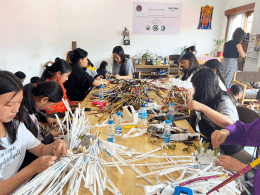Bhutan has launched a fresh chapter in its pursuit of smart governance and citizen-driven development with the official unveiling of the Bhutan Innovation Lab. Spearheaded by the Prime Minister’s Office and Cabinet in collaboration with the United Nations Development Programme (UNDP), the lab aims to inject fresh thinking, data-driven insights, and creative design into national policy-making.
Though inaugurated today, the lab has been quietly laying its foundations over the past four months. A dedicated six-member team is now at the helm, tasked with driving innovation to support the successful execution of Bhutan’s 13th Five-Year Plan and its ambitious 10x economic transformation agenda.
Designed as a collaborative space, the Bhutan Innovation Lab will work closely with government agencies, civil society groups, private enterprises, academia, and the general public to co-develop solutions to some of Bhutan’s most pressing development challenges. From improving public service delivery to addressing systemic inefficiencies, the lab promises to test bold ideas and scale only what works.
Prime Minister Tshering Tobgay called the lab a “safety valve” for innovation. “Some officials want to do things differently but don’t know how to start. That’s where the Bhutan Innovation Lab comes in,” he said at the launch. “Together, we’ll design better approaches and overachieve the targets of the 13th Five-Year Plan.”
The lab will function as a platform for agile policymaking, geared to respond to fast-changing development landscapes. “Today’s complex challenges demand adaptive solutions,” noted UNDP Bhutan Resident Representative Mohammad Younus. “The lab will tackle frontier issues with deep analysis and bold experimentation—aligned with His Majesty’s vision and Bhutan’s 21st-century economic roadmap.”
Innovating for Better Healthcare and Tourism
Among the lab’s first major projects is an overhaul of Bhutan’s hospital appointment system. By bringing together healthcare workers, policymakers, and patients, the team identified long-standing challenges in the current booking process. In collaboration with the Ministry of Health and National Medical Service, the lab has designed user-friendly, efficient solutions to make medical appointments more accessible and patient-centred. These improvements are expected to roll out at the National Referral Hospital by late August or early September.
The lab is also setting its sights on Bhutan’s tourism sector. Through a two-month systems-based analysis, the team explored the sector’s alignment with national economic objectives. They uncovered key barriers, risks, and untapped opportunities. Work is now underway to develop phased, high-impact solutions to enhance the tourism industry’s contribution to the country’s development goals.
By combining bold ideas with grounded, people-first design, the Bhutan Innovation Lab marks a significant shift in how policies are made and tested in the country. As the nation charts its future course, this lab could prove to be a vital catalyst for smarter governance and sustainable progress.








